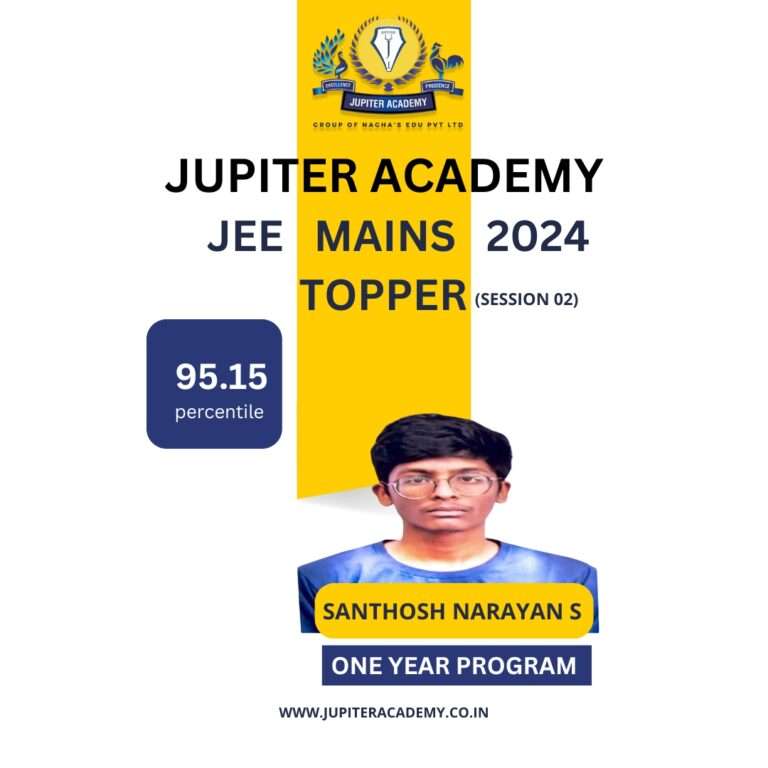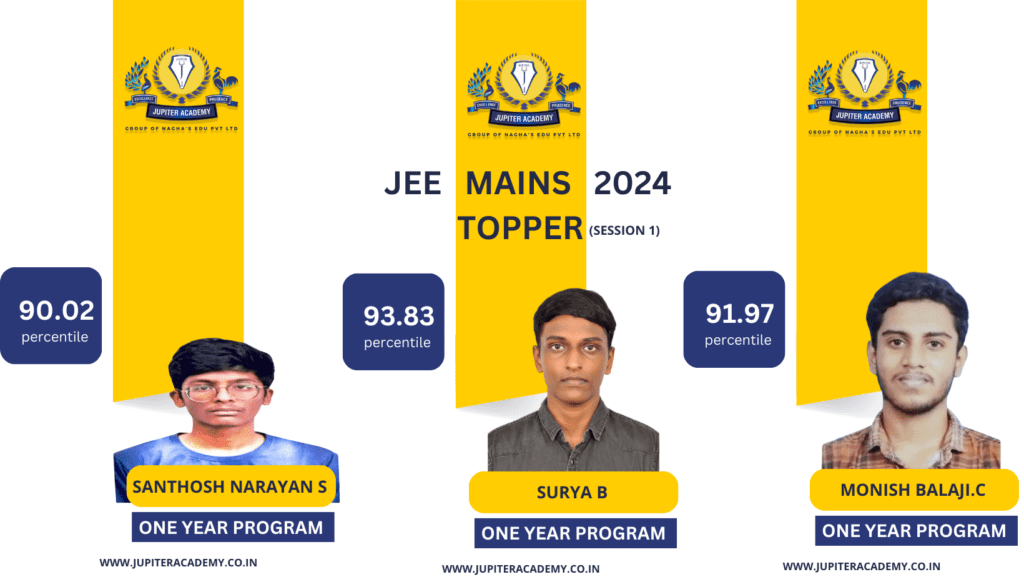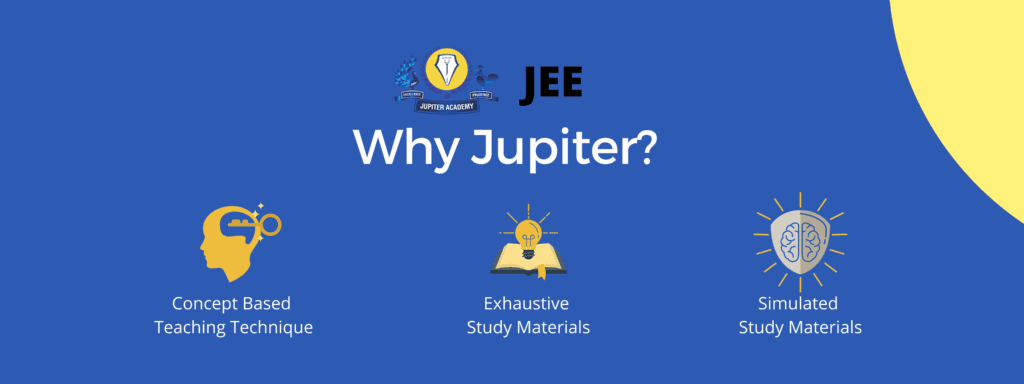JEE Coaching
JEE MAINS 2024 TOPPER - APRIL SESSION

JEE MAINS 2024 TOPPERS : JANUARY SESSION

JEE Main is a computer-based online test conducted by National Testing Agency for students aspiring to pursue undergraduate courses in top engineering institutes in India. JEE Main is the first phase of the IIT Joint Entrance Exam. The entrance examination till 2020 was conducted in two sessions and candidates could take the exam either in the month of January or in April.
Thank you for reading this post, don't forget to subscribe!The candidates could further opt to appear for one exam or both the exams. The better of two NTA scores was considered by the exam conducting authority in preparing the ranks/merit list. More significantly, students are granted admission to IITs, CFITs, NITs, and other Government funded technical institutes based on the marks obtained in JEE Main. Also, the top 2,50,000 students from JEE Main will qualify to appear for JEE Advanced.
Best IIT JEE Mains Coaching
JEE mains
1 Year-
Weekly 4 Days class
-
Test Series
-
Experienced Faculty
-
Exhaustive Study Materils
-
750+ Hours Class
-
1-Year Class Room & Hybrid Course for JEE Mains
-
Question Bank
JEE mains
1 Year-
Weekly 2 Days class
-
Test Series
-
Experienced Faculty
-
Exhaustive Study Materils
-
550+ Hours Class
-
1-Year Class Room & Hybrid Course for JEE Mains
-
Question Bank
JEE mains
2 Years-
Weekly 4 Days class
-
Test Series
-
Experienced Faculty
-
Exhaustive Study Materils
-
1400+ Hours Class
-
2-Years Class Room & Hybrid Course for JEE Mains
-
Question Bank
JEE mains
2 Years-
Weekly 2 Days class
-
Test Series
-
Experienced Faculty
-
Exhaustive Study Materils
-
1000+ Hours Class
-
2-Years Class Room & Hybrid Course for JEE Mains
-
Question Bank

JEE Main Exam Pattern 2024: Paper 1 (B.E/B.Tech)
| Name of Exam | JEE Main |
| Exam Duration | 3 Hours |
| Total Marks | 300 Marks |
| Total Sessions in 2024 | Two Sessions |
| Exam Medium | 13 Languages |
| Examination Category | Undergraduate Level Exam |
| Exam Conducting Authority | NTA (National Testing Agency) |
| Purpose | Admissions to 31 NITs, 23 IIITs and 20 GFTIs |
| Mode of Examination | Computer-based |
| Test Centres | To be notified (India and Abroad) |
| JEE Main Official Website | nta.ac.in |
JEE Main
JEE Main will consist of three papers. Paper 1 will be for students who are planning to take B.Tech courses, whereas Paper 2A will be for B.Arch programs and Paper 2B will be for B.Planning courses. NTA has introduced a new exam pattern for the upcoming 2021 exam. Meanwhile, the registration and application process for the February session started in December. This time JEE Main (Paper 1) will be conducted in four sessions namely February, March, April and May sessions. However, B. Arch and B. Planning papers (papers 2A and 2B) will be held only twice a year in the months of February and May 2021. Further details are provided below.
Students appearing for class 12 board exams with Physics and Maths as their compulsory subjects are eligible to appear for JEE Main 2021. 2019-20 pass-outs are also eligible to appear for this exam. However, before applying for the exam candidates should fulfil the JEE Main eligibility criteria. Failing to do so will result in the rejection of the application.
In JEE Main, the difficulty level of the exam lies between moderate to tough. If we look at the previous year papers and break them down subject-wise, the Chemistry section is usually the easiest while Physics is found to be on a moderate level. Mathematics can be considered to be the toughest. In comparison to JEE Advanced, most of the questions in JEE Main are straightforward and NCERT based. However, a few tricky questions are also present and they are designed to test each candidate’s understanding of the concepts as well as their analytical skills. Meanwhile, NTA has set up several practice centres to familiarise students with the JEE Main examination.
JEE Main Eligibility Criteria
The JEE Main 2024 eligibility criteria have been released by the NTA (National Testing Agency). The JEE Main eligibility criteria are mostly the same for both January and April 2024 sessions. If candidates are planning to apply for the national-level entrance exam this year, then they will find all the information regarding the JEE Main eligibility criteria on this page. In 2024, the exam will be conducted twice. The exam will be held in the months of January and April. Candidates can check the JEE Main eligibility marks and the latest details below.
Age Limit:
- There is no JEE Main age limit . Any student who has passed the 12th class or its equivalent exam in the year 2022, and 2023, or appearing in 2024 can apply for the IIT entrance exam Eligibility Criteria.
Qualifying Exam: Irrespective of the age the applicant can qualify if they have cleared their class 12th or any equivalent exam such as a two-year Pre-University exam, Joint Services Wing of the National Defense Academy exam, senior secondary school examination, Higher Secondary Certificate Vocational Examination, Intermediate or two-year Pre-University examination, a diploma recognized by AICTE or a State board, General Certificate Education (GCE) examination (London/Cambridge/Sri Lanka) at the Advanced (A) level, High School Certificate Examination of the Cambridge University or International Baccalaureate Diploma of the International Baccalaureate Office, Geneva.
JEE Main Number of Attempts
- JEE mains attempt limit is set for for three consecutive years.
- The entrance test will be conducted in two attempts (January and April).
- Students who pass class 10+2 in 2022 and 2023 can appear for JEE main 2024 exam.
JEE Main Subjects
B.E/B.Tech: Applicants should have passed the qualifying exam with Physics, Mathematics, and any one of the chemistry, Biology, Biotechnology, or Technical Vocational Subjects).
B.Arch: Applicants should have passed the qualifying exam with Mathematics, Physics, and Chemistry.
B. Plan: Applicants should have passed the qualifying exam in Mathematics.
JEE Main 2024 Qualifying Exams
- The final exam (10+2 system), is conducted by any recognized Central/ State Board, such as the Central Board of Secondary Education (CBSE), New Delhi; Council for the Indian School Certificate Examinations (ISCE), New Delhi etc.
- The final exam of the 2 years course of the Joint Services Wing of the National Defence Academy
- Senior Secondary School Examination conducted by the National Institute of Open Schooling having a minimum of five subjects.
- Any Public School/ Board/ University examination in India or in any foreign country recognized as equivalent to the 10+2 system by the Association of Indian Universities (AIU)
- Higher Secondary Certificate (HSC) Vocational Examination
- A Diploma recognized by AICTE or a State board of technical education of a minimum of three years duration
- General Certificate Education (GCE) examination (London/Cambridge/Sri Lanka) at the Advanced (A) level
- High School Certificate Examination of the Cambridge University or International Baccalaureate Diploma of the International Baccalaureate Office, Geneva.
- Candidates who completed the class 12 (or equivalent) exam outside India or from a Board not specified above should produce a certificate from the Association of Indian Universities (AIU) to the effect that the exam they have passed is equivalent to the class 12 exam.
- In case the class 12 exam is not a public exam, the candidate must have passed at least one public (Board or Pre-University) exam earlier.
Criteria For admissions in NITs, IIITs, and GFTIs: The candidate must secure 75% Marks in their class 12 board exams or should be within the top 20 percentile of their respective boards. For reserved category candidates, the minimum percentage required for admissions in NITs, IIITs, and GFTIs is 65%.
Qualifying Marks: Candidates who appeared for Class 12th/equivalent in 2022 or 23 are eligible for JEE Main 2024 with a minimum aggregate of 75% for general (65% for SC/ST). There is no age limit for JEE appearing candidates.However the JEE mains attempt limit is set for three consecutive years.here is no minimum pass percentage for appearing in JEE Main exam. However, the applicants must pass their class 12 board or other equivalent examinations.
Subjects Pursued in the Qualifying Exam:
| B.E or B.Tech Courses |
| 1. Physics |
| 2. Mathematics |
| 3. Language Subject |
| 4. Any of the following: Biotechnology, Biology, Chemistry, Technical Vocational Subject |
| 5. Any Optional subject |
| B.Arch/ B.Planning Courses |
| 1. Physics |
| 2. Language Subject |
| 3. Mathematics (Compulsory Subject) |
| 4. Any of the following: Biotechnology, Biology, Chemistry, Technical Vocational Subject |
| 5. Any Optional subject |
JEE Main Exam Pattern
JEE Main Paper 1 comprises Maths, Physics, and Chemistry whereas Paper 2A has Maths, Aptitude, and Drawing Test. Paper 2B will consist of Mathematics, Aptitude and Planning based questions. The candidates can opt for either one or both papers. NTA has also again increased the number of questions in Paper 1. Now there will be 90 questions but candidates can attempt any 75 questions and the total marks allotted is also 300.
All the papers are entirely computer-based online tests whereas the Paper-2 drawing section is conducted offline in a pen and paper-based mode. The exam duration for all the Papers is 3 hours.
JEE Main Paper 1 (B.E or B.Tech Courses)
- Exam Mode: Computer-based offline exam. The students will have to mark their responses on already downloaded answer sheets.
- Exam Duration: 3 hours
- The Questions will be from topics covered in Physics, Chemistry, and Maths.
- Nature of Questions: Objective-type multiple-choice questions as well as numerical-based questions.
- The paper will have a total of 90 questions with 20 questions in section a and 10 in section b. Candidates can attempt 75 questions (300 marks) with 20 questions in section a and 5 questions in section b for each subject – Physics, Chemistry, and Maths.
JEE Main Paper 1 Marking Scheme
- For MCQs, every correct answer will be awarded 4 marks while 1 mark will be deducted for every incorrect answer. No marks are given for questions left unattempted.
- The marking scheme for numerical-based questions includes 4 marks for the correct answer. There is no negative marking even for incorrect answers.
- No marks are given for unanswered questions.
JEE Main Paper 2A (B.Arch Courses)
- Exam Mode: Offline Exam
- Exam Duration: 3 hours
- The questions will be from topics covered in Maths, General Aptitude, and Drawing Skills.
- Mathematics will consist of MCQs and questions for which the answer will be a numerical value. Aptitude will also have MCQs.
- The drawing test will evaluate the sketching and drawing skills.
- Total questions that will be asked in the paper will be 82 out of which students can attempt 77 questions (Mathematics- 25; Aptitude- 50; Drawing- 2).
- Candidates can choose to answer any 5 out of the 10 numerical value-based questions asked in the Mathematics section.
JEE Main Paper 2A Marking Scheme
- For every correct answer in the Maths and Aptitude section, 4 marks will be awarded while 1 mark will be deducted for every incorrect answer.
- There is no negative marking for Drawing questions.
- For the Drawing test, marks will be allotted on the basis of the candidate’s drawing skills.
- Numeric Value questions will contain 4 marks for every correct response. There is no negative marking in case of an incorrect answer or unattempted question.
JEE Main Paper 2B (B.Planning Courses)
- Exam Mode: Computer-based test mode.
- Exam Duration: 3 hours
- The Questions will be from topics covered in Maths, General Aptitude, and Planning skills.
- Mathematics and Aptitude will have single correct objective type multiple-choice questions. Planning-based questions will also be MCQ type.
- Total questions that will be asked in the paper will be 105 out of which students can attempt 100 questions.
- In this paper also, candidates can choose to answer any 5 out of the 10 numerical value-based questions asked in the Mathematics section.
JEE Main Paper 2B Marking Scheme
- For every correct answer, 4 marks will be awarded while 1 mark will be deducted for every incorrect answer.
- 4 marks will be awarded for the correct answer in numerical-based questions. No negative marking is given.
Note: All the calculations/writing work should be done only in the Rough Sheet provided at the Test
Centre or the examination Room/Hall. Once the exam is over candidates should hand over the rough sheets to the invigilator.
Important Chapters for JEE Main
Maths
| Vectors | 3D Geometry |
| Sequence and Series | Determinant and Matrices |
| Circles | Straight Lines |
| Definite Integral | Probability Distribution |
| Functions | Limits and Continuity |
| Conic Sections | Application of Derivatives |
| Quadratic Equation | Complex Numbers |
| Binomial Theorem | Area under the Curve |
| Differentiability |
Physics
| Ray Optics | Thermodynamics |
| Semiconductors | EM Waves |
| Gravitation | Magnetism |
| Alternating Current | Wave Optics |
| Electromagnetic Induction | Oscillations |
| Kinematics | Rotation |
| Current Electricity | Electrostatics |
| Magnetic Effects of Current | Properties of Matter |
| Bohr’s Atomic Model | Waves and Sound |
Chemistry
| Gaseous and Liquid State | Atomic Structure |
| Chemical Kinetics | Electrochemistry |
| Chemical Bonding | Surface Chemistry |
| Coordination Compound | D Block Elements |
| Aromatic Compounds | Alkyl Halides |
| P Block Elements | Thermodynamics |
| Isomerism | General Organic Chemistry |
| Carboxylic Acids | Aldehydes and Ketones |
| Nuclear Chemistry |

